I saw this at the Benedettoxviforum. He has done a translation which is below. RED are Youth Questions Blue is the Pope. There are more pictures at the link. I swear for a tought week poor old Pope looks upbeat!!
At 8:20 Thursday night, the Holy Father met the young people of Rome and Lazio in St. Peter's Square for an encounter preparatory to World Youth Day which will be celebrated on Palm Sunday at the diocesan level. It will also be the 25h anniversary of the first WYD convoked by John Paul II in Rome in 1985.
The arrival of the Holy Father was preceded by a program of celebration and reflection organized by the diocesan service of Rome for pastoral ministry to youth. Taking part were at least 70,000 representatives from the parishes of Rome and the dioceses of Lazio province where Rome is located.
After greetings by Cardinal Agostino Valli, the Pope's Vicar for Rome, and a youth leader, three other young people took turns posing a question to the Holy Father on the theme of this year's WYD, taken from the Gospel narrative of Jesus and the rich young man. Here is a translation of the Q&A:
Holy Father, the young man in the Gospel asked Jesus: "Good teacher, what should I do to inherit eternal life?" But I don't even know what 'eternal life' is. I cannot imagine it, but one thing I am sure of: I don't want to throw my life away, I want to live it in depth, and not by myself. Nut I am afraid this may not happen, I am afraid that I am thinking only of myself, that I will be wrong on everything and find myself without a goal to reach for, just living by the day. Is it possible to make something beautiful and good of my life?
THE POPE: Dear young people, before answering the question, I wish to say thank you from the heart for your presence, for this wonderful testimony of faith, of wanting to live in communion with Jesus, for your enthusiasm in following Jesus and to live right. Thank you!
And now the question. You said you do not know what eternal life is and cannot even imagine it. None of us is able to imagine eternal life because it is outside our experience. Nonetheless, we can begin to understand what it might be, and I think that with your question, you have given us a description of what is essential in eternal life, namely, of true life: not to throw your life away, to live it to the depth, not to live for yourself, not to live by the day, but to truly live life in its richness and in its totality.
[I marvelled last night at how he repeated the young man's question almost word for word as if he had been reading from notes! It is what his students always said of him- that he could recapitulate a question precisely, no matter how complex, before answering it.] But how to do this? This is the great question, what the rich young man came to see the Lord about (fr Mk 10,19).
At first glance, the Lord's response seems very sparse. In short, he says: Follow the commandments (cfr Mk 10,19), But if we reflect well, if we listen well to the Lord, in the totality of the Gospel, we find the great wisdom of the Word of God, of Jesus. The commandments, according to another Word from Jesus, are summed up in one alone: love God with all your heart, with all your reason, with all your existence, and love your neighbor as you love yourself.
This is the first step we must make: to seek to know God. Thus we will learn that our life is not by chance, it is not random. My life was wanted by God in eternity. I am loved, I am needed. God has a plan for me. So my life is important and even necessary. Eternal love created me with depth and awaits me.
So that is the first point: seek to know God and thus understand that life is a gift, that it is good to live. Then the essential is love. To love the God who created me, who created this world, who governs through all the difficulties of man and history, and who is with me. And to love one's neighbor.
The Ten Commandments which Jesus refers to in his answer simply makes the commandment of love explicit. They show the way of love with these essential points: the family, as the foundation of society; life, to be respected as gift of God; the sense of sexuality, as the relationship between a man and a woman; the social order; and finally, truth.
These essential elements make the way of love explicit, how to love truly, and how to find the right way. God has a fundamental will for each of us which is identical for all of us. But its application is different in each life, because God has a precise plan for each man. St. Francis de Sales said once that perfection - to be good - and living in faith and love are substantially one and the same, but possible in very different forms.
The holiness of a Carthusian monk is different from that of a politician, a scientist or a peasant, and so on. So, since God has a plan for every man, I should find what it is, in my circumstances, in my way of love that is the singular as well as common will of God, whose rules are indicated in the commandments as explications of love.
Thus also, to seek to fulfill the essence of love, which is not to take life for myself but to give life; not to 'have' life, but make my life a gift to others; not to gratify myself but to give to others. This essential - but it implies renunciation, which means, going out of myself, not seeking myself. By not seeking myself but giving myself for great and true things, I find true life.
So, everyone must find the diverse possibilities in one's life - to commit yourself to volunteer work, to a community of prayer, in a movement, in parish activity, in your profession. To find my calling and to live it is important and fundamental, whether I am a great scientist or a peasant.
Everyone is important in the eyes of God. it is beautiful if live is lived to the depth, with that love which truly redeems the world. Finally, let me tell you a little anecdote about St. Josephine Bakhita, this tiny African saint who found God and Christ in Italy, and who has always made a great impression on me. She was a sister in an Italian convent.
One day, the bishop came to visit the monastery, sees this tiny black nun, about whom he appears not to have known anything, and asks her: "Sister, what are you doing here?" Bakhita answers, "Exactly what you are doing, Excellency". The bishop, visibly irritated, said, "What do you mean, doing the same thing I am?". "Yes, we are both doing the will of God, are we not?"
So this is essential: to know the Word of God, with the help of the Church and of friends, both in its broad lines that are common to all, and in the concreteness of my personal life. This way, life becomes perhaps not too easy, but beautiful and happy. Let us pray to the Lord that he may always help us to find his will and follow it with joy.
The Gospel tells us that God looked at the young man and loved him. Holy Father, what does it mean to have the look of love from Jesus. How can we today make this our experience? And is it really possible to have this experience even in our day?
Of course I would say Yes, because the Lord is always present and looks at each of us with love. But first we have to find this look and encounter him.
How to do this? I would say the first thing is to have an experience of his love and to know him. Getting to know Jesus can be done in different ways. A first condition is to know him as he is presented in the Gospels, which gives us a very rich picture of Jesus, in the great parables - think of the prodigal son, the good Samaritan, Lazarus, etc.
In all these parables, in all his words, in the Sermon on the Mount, we find the real face of Jesus, the face of God, up to the Cross, where for love of us, he gives himself totally up to death, and at the hand, he could say, "Father, into your hands I commend my spirit", my life (cfr Lk 23,46). Therefore: know Jesus, meditate on him with your friends, with the Church, and know him not only in an academic, theoretical way, but with the heart, and thus, talk to Jesus in prayer. One cannot be able to know a person the way one can study mathematics.
For this, reason is necessary and sufficient. but to be able to know a person, above all the great figure of Christ, God and man, we need reason, but at the same time, also the heart. Only by opening our heart to him, only with a knowledge of the totality of what he said and what he did, and then, with our love, going towards him, we will be able gradually to know him even better and experience what it is to be loved.
So, listen to the Word of God, listen to it in the communion of the Church, in her great experience, and respond with our prayer, our personal conversation with Jesus, where we can tell him what we cannot understand, our needs, our questions.
In a true conversation, we will always find more of this road to knowledge which becomes love. Of course, not just yo think, not just to pray, but to walk toward him: by doing good things, to be committed to our neighbor. Again, there are different ways.
Each one knows his own possibilities, in the parishes and communities where we live, to commit ourselves to Christ and for others, for the vitality of the Church, so that the faith can truly be a formative power in our society, and of our time.
Again, the elements are: listen, respond, enter into the community of believers, into communion with Christ through the Sacraments, in which he gives himself to us, in the Eucharist, in confession, etc.:and finally, carry out the words of faith so that they become a power in my own life, and in that way, I will really see the loving look of Jesus , and his love will help me and transform me.
Jesus asked the young man to leave everything and to follow him, but he went away sad. Like him, I would find it hard to follow him because I am afraid to leave my things and often, the Church asks me to make difficult renunciations. Holy Father, how can I find the strength to make courageous choices and who can help me?
There it is. Let us start with a word which is difficult for us: renunciation. Renunciations are possible, and in the end, they can become beautiful if there is a reason to make them, and that reason justifies even the difficulties of renouncing. St. Paul used, in this context, the image of the Olympics and the athletes engaged in these contests (cfr 1Cor 9,124-23).
He says: In order to win the medal - or at that time, the crown - they must live a very difficult discipline, they must give up a lot of things, they must practice the sport they will compete in, and make great sacrifices and renunciations because they have a motivation that is worth it all.
Even if, in the end perhaps, I may not end up among the winners, it is still a beautiful thing to have disciplined myself and to be able to do these things with a kind of perfection. So the same thing that made it worth, in this image of the Olympics that St. Paul gave, for all sports, is also the same for all other things in life.
A good professional life cannot be reached without some renunciation, without adequate preparation that always requires discipline, that demands giving up something - and so it is in art, and in all the aspects of life. We all understand that in order to reach a goal, whether it is professional, sports, artistic, cultural - we must renounce, give up something, learn from this in order to go ahead.
Even the art of living, of being oneself, the art of being a man, demands renunciation. And the true renunciations which will help us find the way of life, the art of life, are found in the Word of God.
They help us from falling, shall we say, into the abyss of drugs, of alcohol, of slavery to sexuality, of the slavery to money, and laziness. All these things, initially, may appear to be free actions. But they are not free, but the start of a slavery that becomes ever more insuperable. To succeed in renouncing the temptations of the moment, to proceed towards the good, creates true freedom and makes life precious.
In this sense, I think, we must see that without saying No to certain things, then the great Yes to true life cannot come, as we see even in the lives of saints. Let us think of St. Francis, of the saints of our time, Mother Teresa, don Gnocchi, and so many others who renounced and have won - they became not just free but a treasure for the world, who can show us how one can live.
To the question, "who will help me?", I would say the great figures in the history of the Church, the Word of God helps us, the parish community, the movement, volunteer work, etc. And we are helped by the friendship of those who are 'moving ahead', who have already made progress on the road of life and who can convince me that they are on the right road. Let us pray to the Lord that he may always gives us such friends and communities which help us to see the road of goodness, and thus find life beautiful and joyous.
At 8:20 Thursday night, the Holy Father met the young people of Rome and Lazio in St. Peter's Square for an encounter preparatory to World Youth Day which will be celebrated on Palm Sunday at the diocesan level. It will also be the 25h anniversary of the first WYD convoked by John Paul II in Rome in 1985.
The arrival of the Holy Father was preceded by a program of celebration and reflection organized by the diocesan service of Rome for pastoral ministry to youth. Taking part were at least 70,000 representatives from the parishes of Rome and the dioceses of Lazio province where Rome is located.
After greetings by Cardinal Agostino Valli, the Pope's Vicar for Rome, and a youth leader, three other young people took turns posing a question to the Holy Father on the theme of this year's WYD, taken from the Gospel narrative of Jesus and the rich young man. Here is a translation of the Q&A:
Holy Father, the young man in the Gospel asked Jesus: "Good teacher, what should I do to inherit eternal life?" But I don't even know what 'eternal life' is. I cannot imagine it, but one thing I am sure of: I don't want to throw my life away, I want to live it in depth, and not by myself. Nut I am afraid this may not happen, I am afraid that I am thinking only of myself, that I will be wrong on everything and find myself without a goal to reach for, just living by the day. Is it possible to make something beautiful and good of my life?
THE POPE: Dear young people, before answering the question, I wish to say thank you from the heart for your presence, for this wonderful testimony of faith, of wanting to live in communion with Jesus, for your enthusiasm in following Jesus and to live right. Thank you!
And now the question. You said you do not know what eternal life is and cannot even imagine it. None of us is able to imagine eternal life because it is outside our experience. Nonetheless, we can begin to understand what it might be, and I think that with your question, you have given us a description of what is essential in eternal life, namely, of true life: not to throw your life away, to live it to the depth, not to live for yourself, not to live by the day, but to truly live life in its richness and in its totality.
[I marvelled last night at how he repeated the young man's question almost word for word as if he had been reading from notes! It is what his students always said of him- that he could recapitulate a question precisely, no matter how complex, before answering it.] But how to do this? This is the great question, what the rich young man came to see the Lord about (fr Mk 10,19).
At first glance, the Lord's response seems very sparse. In short, he says: Follow the commandments (cfr Mk 10,19), But if we reflect well, if we listen well to the Lord, in the totality of the Gospel, we find the great wisdom of the Word of God, of Jesus. The commandments, according to another Word from Jesus, are summed up in one alone: love God with all your heart, with all your reason, with all your existence, and love your neighbor as you love yourself.
This is the first step we must make: to seek to know God. Thus we will learn that our life is not by chance, it is not random. My life was wanted by God in eternity. I am loved, I am needed. God has a plan for me. So my life is important and even necessary. Eternal love created me with depth and awaits me.
So that is the first point: seek to know God and thus understand that life is a gift, that it is good to live. Then the essential is love. To love the God who created me, who created this world, who governs through all the difficulties of man and history, and who is with me. And to love one's neighbor.
The Ten Commandments which Jesus refers to in his answer simply makes the commandment of love explicit. They show the way of love with these essential points: the family, as the foundation of society; life, to be respected as gift of God; the sense of sexuality, as the relationship between a man and a woman; the social order; and finally, truth.
These essential elements make the way of love explicit, how to love truly, and how to find the right way. God has a fundamental will for each of us which is identical for all of us. But its application is different in each life, because God has a precise plan for each man. St. Francis de Sales said once that perfection - to be good - and living in faith and love are substantially one and the same, but possible in very different forms.
The holiness of a Carthusian monk is different from that of a politician, a scientist or a peasant, and so on. So, since God has a plan for every man, I should find what it is, in my circumstances, in my way of love that is the singular as well as common will of God, whose rules are indicated in the commandments as explications of love.
Thus also, to seek to fulfill the essence of love, which is not to take life for myself but to give life; not to 'have' life, but make my life a gift to others; not to gratify myself but to give to others. This essential - but it implies renunciation, which means, going out of myself, not seeking myself. By not seeking myself but giving myself for great and true things, I find true life.
So, everyone must find the diverse possibilities in one's life - to commit yourself to volunteer work, to a community of prayer, in a movement, in parish activity, in your profession. To find my calling and to live it is important and fundamental, whether I am a great scientist or a peasant.
Everyone is important in the eyes of God. it is beautiful if live is lived to the depth, with that love which truly redeems the world. Finally, let me tell you a little anecdote about St. Josephine Bakhita, this tiny African saint who found God and Christ in Italy, and who has always made a great impression on me. She was a sister in an Italian convent.
One day, the bishop came to visit the monastery, sees this tiny black nun, about whom he appears not to have known anything, and asks her: "Sister, what are you doing here?" Bakhita answers, "Exactly what you are doing, Excellency". The bishop, visibly irritated, said, "What do you mean, doing the same thing I am?". "Yes, we are both doing the will of God, are we not?"
So this is essential: to know the Word of God, with the help of the Church and of friends, both in its broad lines that are common to all, and in the concreteness of my personal life. This way, life becomes perhaps not too easy, but beautiful and happy. Let us pray to the Lord that he may always help us to find his will and follow it with joy.
The Gospel tells us that God looked at the young man and loved him. Holy Father, what does it mean to have the look of love from Jesus. How can we today make this our experience? And is it really possible to have this experience even in our day?
Of course I would say Yes, because the Lord is always present and looks at each of us with love. But first we have to find this look and encounter him.
How to do this? I would say the first thing is to have an experience of his love and to know him. Getting to know Jesus can be done in different ways. A first condition is to know him as he is presented in the Gospels, which gives us a very rich picture of Jesus, in the great parables - think of the prodigal son, the good Samaritan, Lazarus, etc.
In all these parables, in all his words, in the Sermon on the Mount, we find the real face of Jesus, the face of God, up to the Cross, where for love of us, he gives himself totally up to death, and at the hand, he could say, "Father, into your hands I commend my spirit", my life (cfr Lk 23,46). Therefore: know Jesus, meditate on him with your friends, with the Church, and know him not only in an academic, theoretical way, but with the heart, and thus, talk to Jesus in prayer. One cannot be able to know a person the way one can study mathematics.
For this, reason is necessary and sufficient. but to be able to know a person, above all the great figure of Christ, God and man, we need reason, but at the same time, also the heart. Only by opening our heart to him, only with a knowledge of the totality of what he said and what he did, and then, with our love, going towards him, we will be able gradually to know him even better and experience what it is to be loved.
So, listen to the Word of God, listen to it in the communion of the Church, in her great experience, and respond with our prayer, our personal conversation with Jesus, where we can tell him what we cannot understand, our needs, our questions.
In a true conversation, we will always find more of this road to knowledge which becomes love. Of course, not just yo think, not just to pray, but to walk toward him: by doing good things, to be committed to our neighbor. Again, there are different ways.
Each one knows his own possibilities, in the parishes and communities where we live, to commit ourselves to Christ and for others, for the vitality of the Church, so that the faith can truly be a formative power in our society, and of our time.
Again, the elements are: listen, respond, enter into the community of believers, into communion with Christ through the Sacraments, in which he gives himself to us, in the Eucharist, in confession, etc.:and finally, carry out the words of faith so that they become a power in my own life, and in that way, I will really see the loving look of Jesus , and his love will help me and transform me.
Jesus asked the young man to leave everything and to follow him, but he went away sad. Like him, I would find it hard to follow him because I am afraid to leave my things and often, the Church asks me to make difficult renunciations. Holy Father, how can I find the strength to make courageous choices and who can help me?
There it is. Let us start with a word which is difficult for us: renunciation. Renunciations are possible, and in the end, they can become beautiful if there is a reason to make them, and that reason justifies even the difficulties of renouncing. St. Paul used, in this context, the image of the Olympics and the athletes engaged in these contests (cfr 1Cor 9,124-23).
He says: In order to win the medal - or at that time, the crown - they must live a very difficult discipline, they must give up a lot of things, they must practice the sport they will compete in, and make great sacrifices and renunciations because they have a motivation that is worth it all.
Even if, in the end perhaps, I may not end up among the winners, it is still a beautiful thing to have disciplined myself and to be able to do these things with a kind of perfection. So the same thing that made it worth, in this image of the Olympics that St. Paul gave, for all sports, is also the same for all other things in life.
A good professional life cannot be reached without some renunciation, without adequate preparation that always requires discipline, that demands giving up something - and so it is in art, and in all the aspects of life. We all understand that in order to reach a goal, whether it is professional, sports, artistic, cultural - we must renounce, give up something, learn from this in order to go ahead.
Even the art of living, of being oneself, the art of being a man, demands renunciation. And the true renunciations which will help us find the way of life, the art of life, are found in the Word of God.
They help us from falling, shall we say, into the abyss of drugs, of alcohol, of slavery to sexuality, of the slavery to money, and laziness. All these things, initially, may appear to be free actions. But they are not free, but the start of a slavery that becomes ever more insuperable. To succeed in renouncing the temptations of the moment, to proceed towards the good, creates true freedom and makes life precious.
In this sense, I think, we must see that without saying No to certain things, then the great Yes to true life cannot come, as we see even in the lives of saints. Let us think of St. Francis, of the saints of our time, Mother Teresa, don Gnocchi, and so many others who renounced and have won - they became not just free but a treasure for the world, who can show us how one can live.
To the question, "who will help me?", I would say the great figures in the history of the Church, the Word of God helps us, the parish community, the movement, volunteer work, etc. And we are helped by the friendship of those who are 'moving ahead', who have already made progress on the road of life and who can convince me that they are on the right road. Let us pray to the Lord that he may always gives us such friends and communities which help us to see the road of goodness, and thus find life beautiful and joyous.

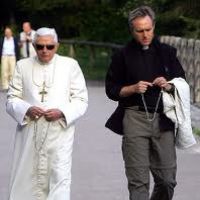

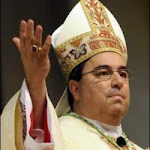



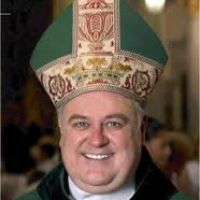
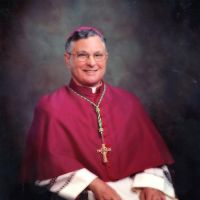
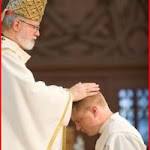

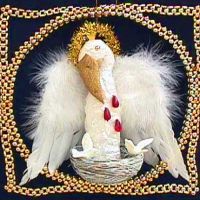
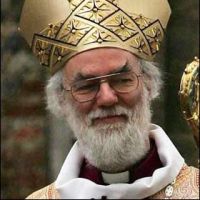
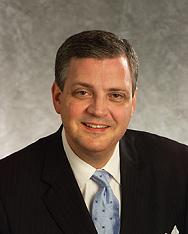

No comments:
Post a Comment